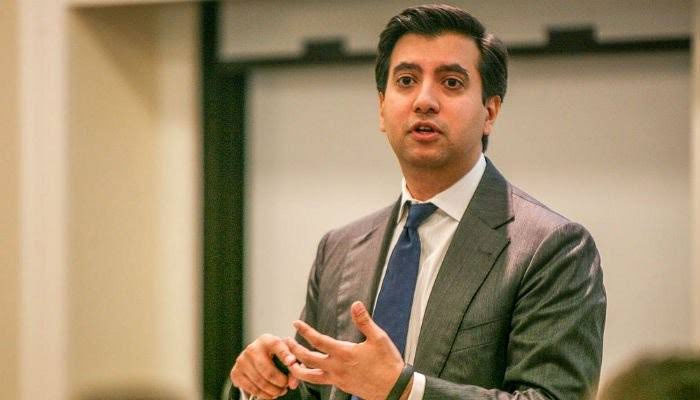After first phase of Afghan peace: Pakistan, US need to broaden partnership
WASHINGTON: Since achieving the first phase of political resolution to the conflict in Afghanistan, the United States and Pakistan both need to focus on broadening their partnership, said Ali Jahangir Siddiqui, Pakistan’s Ambassador at Large for Foreign Investment.
Addressing a special session held at the Middle East Institute, a local think tank, Ambassador Siddiqui reminded the audience present at the event that the US Pakistan partnership had been broad-based covering economic and trade relationship as well as cooperation education and cultural exchange.
“Over the years, this partnership has shaped other global bilateral interactions as well as regional political developments. Whether it was brokering the US-China political relationship, assisting in the fight against the Soviet invasion of Afghanistan or more recently counterterrorism cooperation, the US-Pakistan relationship has played a crucial role in maintaining global peace and stability,” Ambassador Siddiqui said. The event Siddiqui addressed was titled, “Leveraging a moment of change: Pathways to sustainable US-Pakistan relationship.” The event was held to launch a policy paper that explores a range of ideas and concrete proposals designed to move the relationship in a positive and stable direction. These recommendations were proposed by an expert group of academics, policy analysts and retired government officials.
Ambassador Siddiqui said that from the mid-2000s the relationship had gone from being multifaceted to being security-focused. “This limited the potential of a relationship that has much to give to both partners,” Siddiqui further said, Pakistan’s offering of tourism, music, art, ancient civilization, literature and crucially, business opportunity, had been overshadowed by a security narrative. He called it a loss to both sides.
Due to the context of the Afghan war, the relationship had become one that was driven by security matters with all other areas of cooperation becoming deemphasized, he said. “Pakistan clearly recognized that we needed to broaden the relationship but we understood where the priorities lay for the US Administration,” Siddiqui further added. He called the policy paper important and timely that represents a broad, consensus view of how the foreign policy community in Washington thinks about the importance of this bilateral relationship, as well as what could serve as building blocks for a strong partnership between the two countries, he said. “Washington is a busy place. The Administration and Capitol Hill have much on their plate especially in an election year and within the small space for foreign policy there is much to cover,” he said hoping that through the focused study, the Middle East Institute would assist US foreign policy officials to carve out the foundation of a close and mutually beneficial relationship between the two countries. “A relationship that is built on principles of respect, partnership and profit for the benefit of both our peoples,” Siddiqui said.
-
 Lawyer Of Epstein Victims Speaks Out Directly To King Charles, Prince William, Kate Middleton
Lawyer Of Epstein Victims Speaks Out Directly To King Charles, Prince William, Kate Middleton -
 Microsoft CEO Shares How Gates Doubted $1bn OpenAI Investment
Microsoft CEO Shares How Gates Doubted $1bn OpenAI Investment -
 Milo Ventimiglia Calls Fatherhood 'pretty Wild Experience' As He Expects Second Baby With Wife Jarah Mariano
Milo Ventimiglia Calls Fatherhood 'pretty Wild Experience' As He Expects Second Baby With Wife Jarah Mariano -
 Chinese Scientists Unveil Advanced AI Model To Support Deep-space Exploration
Chinese Scientists Unveil Advanced AI Model To Support Deep-space Exploration -
 Anthropic’s New AI Tool Wipes Billions Off Cybersecurity Stocks
Anthropic’s New AI Tool Wipes Billions Off Cybersecurity Stocks -
 Trump Announces He Is Sending A Hospital Ship To Greenland Amid Rising Diplomatic Tensions
Trump Announces He Is Sending A Hospital Ship To Greenland Amid Rising Diplomatic Tensions -
 'Never Have I Ever' Star Maitreyi Ramakrishnan Lifts The Lid On How She Avoids Drama At Coffee Shops Due To Her Name
'Never Have I Ever' Star Maitreyi Ramakrishnan Lifts The Lid On How She Avoids Drama At Coffee Shops Due To Her Name -
 Inside Prince William’s Plans For Prince Harry: What Will Happen To Duke Once He’s King
Inside Prince William’s Plans For Prince Harry: What Will Happen To Duke Once He’s King -
 Chyler Leigh Pays Moving Homage To 'Grey’s Anatomy' Co-star Eric Dane: 'He Was Amazing'
Chyler Leigh Pays Moving Homage To 'Grey’s Anatomy' Co-star Eric Dane: 'He Was Amazing' -
 Did You Know Tech CEOs Limit Screen Time For Their Own Kids?
Did You Know Tech CEOs Limit Screen Time For Their Own Kids? -
 Matthew Lillard Admits Fashion Trends Are Not His 'forte'
Matthew Lillard Admits Fashion Trends Are Not His 'forte' -
 SpaceX Launches Another Batch Of Satellites From Cape Canaveral During Late-night Mission On Saturday
SpaceX Launches Another Batch Of Satellites From Cape Canaveral During Late-night Mission On Saturday -
 Princess Beatrice, Eugenie Get Pulled Into Parents’ Epstein Row: ‘At Least Stop Clinging!’
Princess Beatrice, Eugenie Get Pulled Into Parents’ Epstein Row: ‘At Least Stop Clinging!’ -
 Inside Kim Kardashian's Brain Aneurysm Diagnosis
Inside Kim Kardashian's Brain Aneurysm Diagnosis -
 Farmers Turn Down Millions As AI Data Centres Target Rural Land
Farmers Turn Down Millions As AI Data Centres Target Rural Land -
 Trump Announces A Rise In Global Tariffs To 15% In Response To Court Ruling, As Trade Tensions Intensify
Trump Announces A Rise In Global Tariffs To 15% In Response To Court Ruling, As Trade Tensions Intensify




